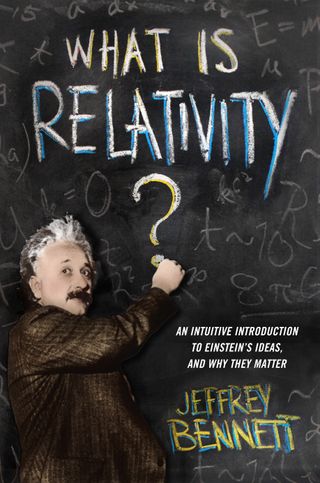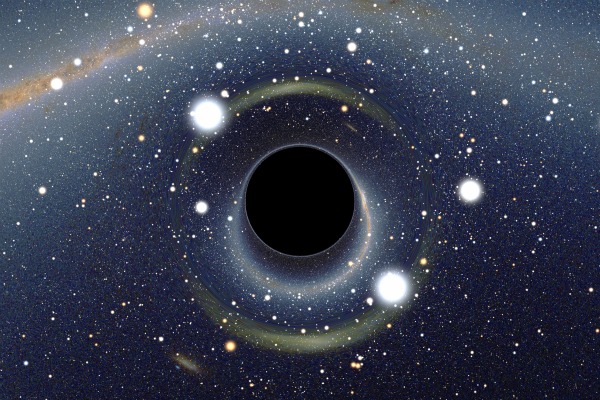Easy Explanation of Einstein's Theory of Relativity
What Is Relativity? New Book Offers Simple Explanation

Why can't anything travel faster than the speed of light? Do black holes really suck? And why is the universe expanding?
These are just a few of the questions author and astrophysicist Jeffrey Bennett answers in his new book, "What is Relativity" (Columbia University Press, 2014).
On the 100th anniversary of Albert Einstein's general theory of relativity, Bennett's book seeks to explain both special and general relativity in a form that a nonexpert could understand. [Book Excerpt: "What is Relativity"]
"There are a lot of good books about relativity, but most have been targeted at a high level of understanding," Bennett told Space.com. He wanted to provide an introduction to the ideas that even a smart middle schooler could understand.
Nothing faster than light
Bennett defines relativity as a modern scientific explanation of space, time, gravity and the universe. Albert Einstein discovered two things: The laws of nature are the same for everyone, and the speed of light is the same for everyone. Einstein discovered special relativity first in 1905, but special relativity is just a special case of general relativity that doesn't involve gravity.
Einstein realized that the speed of light is a constant 186,000 miles/second (300,000 kilometers/second), and that nothing could exceed it. Imagine a person traveling on a spaceship with headlights. The light from the headlights would travel at the same speed whether the ship were stopped or moving, so to an observer, the ship would have to be traveling more slowly than light, Bennett explained.
![Black holes are strange regions where gravity is strong enough to bend light, warp space and distort time. [See how black holes work in this SPACE.com infographic.]](https://cdn.mos.cms.futurecdn.net/8GbuLi8DVtx8HoZeSyndT7.jpg)
Journey to a black hole
In his book, Bennett takes readers on a journey to a black hole. Common sense holds that if the sun were to suddenly be replaced by a black hole, it would suck up the Earth and the other planets. Not so, Bennett said.
Because the nearest black hole is so far away, a person would have to travel at close to the speed of light to get there within his or her lifetime. At that speed, all sorts of weird effects come into play. For example, people on Earth would experience more time passing during the journey than the traveler would, a phenomenon called time dilation. Special relativity shows that everyone on Earth would be much older than the traveler when he or she returned.
Once the traveler reaches the black hole, rather than being sucked in, the traveler would simply go into orbit around it (unless he or she were aimed almost directly at it). A black hole has gravity just like any other object. But very close to the black hole, gravity gets really bizarre. If you dropped a clock into a black hole, for instance, it would show time passing more slowly, and light from the clock would appear more reddish. Light is a wave that vibrates at a certain frequency, and red light has a lower frequency than blue light. Since the clock's time appears to run slow, its light also has a lower frequency.
Now imagine there's a second traveler who jumps out of the ship and falls into the black hole. From his perspective, he would fall faster and faster until he reached oblivion. But from the perspective of the other traveler, the falling traveler would take forever to reach the black hole's event horizon, the point at which nothing (not even light) can escape. These effects, known as gravitational time dilation, can be explained by Einstein's theory of general relativity.
Relativity in daily life
Relativity seems strange, because it goes against common sense. But in fact, the effects of relativity are always present; they just aren't noticeable except at extreme speeds and extreme gravity, Bennett said. Relativity is critical to everything from how the sun shines to how GPS works. "Relativity is in everything we do in our lives," he said.
Einstein's theories yielded the famous equation E=mc2, which shows how mass (m) can be converted into energy (E). For example, nuclear fusion in the sun's core converts hydrogen into helium, giving off sunlight.
GPS satellites orbit the Earth fast enough and far enough away for time dilation due to both special and general relativity to come into play. In order to work accurately, GPS must correct for these effects.
Bennett hopes his book will convince readers that anyone can understand relativity, even without a background in physics.
"Relativity has a reputation for being hard, but I don't think this book is hard," he said.
Follow Tanya Lewis on Twitter and Google+ .Follow us @Spacedotcom ,Facebook and Google+ . Original article on Space.com.

Join our Space Forums to keep talking space on the latest missions, night sky and more! And if you have a news tip, correction or comment, let us know at: community@space.com.
Source: https://www.space.com/25481-what-is-relativity-book-einstein.html